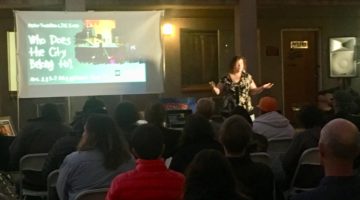
Photo Courtsey of Our Town Reno Corey McDowell, a University of Nevada, Reno, student perfoms street art in downtown Reno for an Our Town Reno documentary called “Invisible Girl.” McDowell said while she was homeless, she got support from the downtown Reno homeless community, who helped quiz her for upcoming quizzes and exams.
From escaping an inhospitable home environment to sleeping on a hotel-room floor with eight other people, Corey McDowell will finally be receiving her master’s degree in social work from the University of Nevada, Reno, this spring.
At the age of 17, McDowell found herself kicked out of her home in Reno as it was overcome by hostility due to a mental illness in her family. McDowell was homeless throughout her last year in high school and graduated while she was still homeless. She then obtained a stable housing situation, but once she started at UNR, she found herself without a home again.
“Altogether I was probably homeless for a year and a half, and school was probably the one stable thing in my life, and lucky for me I had a lot of mentors and people that were there for me and people who really helped me through the education system, so I was grateful for that,” McDowell said.
During her first year at UNR, McDowell dropped out but stayed on campus doing grant work. McDowell said it was nice to have the structure of school, so she went to Truckee Meadows Community College and got her associate’s degree. After receiving her AA, she decided to give UNR another shot for her master’s degree.
“Being homeless while in school, you have to have a drive that a lot of times your parents give you like to wake up on time, do your homework, go to sleep on time, stuff like that,” McDowell said. “You have to do that on your own, and of course I was a teenager and I was finally free, so a lot of the things that people do to prepare themselves kind of fell to the wayside, and I didn’t have a lot of opportunities to find showers and food, so it was more about my basic needs than the reading that the professor assigned. It was an interesting dichotomy.”
McDowell said she was lucky she got good grades throughout her schooling because she received scholarships and grants to pay for school and some of her living expenses. There are not many scholarship opportunities given to homeless students, so McDowell relied strictly on her grades.
“Our prices here are exorbitant; tuition is ridiculous and the federal funding for student aid just now became inclusive of homeless youth,” McDowell said. “Before it was determined by your parents unless you had a child, had been in military … there was just a few criteria even though I wasn’t able to talk to my family.”
McDowell is graduating next spring with a master’s degree in social work, a major she did not intend on pursuing until the university got rid of its four-year degree in logistics, the degree she had planned on obtaining. McDowell was volunteering at the Children’s Cabinet, an organization dedicated to address the needs of youth and families, when she met a child who told her, “Man, I wish you were my social worker.” McDowell thought, “Well, I could be.”
Not until after McDowell took several classes and participated in the volunteer activities necessary for the social work program did she realize she could have been identified as a homeless youth.
“I didn’t identify as [homeless], which most people don’t, especially if they are younger,” McDowell said. “They are just runaways or they’re just kids hanging out, partying, doing whatever they do. You don’t identify as that even though it is true. I was sleeping in abandoned buildings, or sometimes I didn’t have any place to sleep at night, so sometimes I would ride the bus all night and sleep in the park during the day, or I was staying in weekly motels or couch-hopping or staying with other friends who were also homeless and young, and we would all go donate plasma to get enough money to get a weekly motel. There would be like eight of us living in literally one room — not a living room with a room … just a single room. That’s just the way that it was.”
After McDowell found out she had qualified as a homeless youth, she began to focus on that area of the field and used her unique experience to see the logistical side of homelessness.
McDowell has also focused on the homeless situation in Reno, a place where she said it is almost illegal to be homeless because of all the laws against loitering, sitting on the sidewalk and camping. She said the Reno Police Department does a lot to keep homeless people from congregating in places within the city and the way the city has addressed homelessness is certainly not the best way to address the issue.
“We also have a penalizing system for youth who are underage and homeless and that don’t have a family,” McDowell said. “In my situation, I would have been considered ‘a child in need of supervision,’ which is a status offense. They can’t put you in jail for it, but when I was homeless, they could if you were a runaway — you could go to jail — now they just take you back to the home that you were leaving. Ninety percent of children who run away [do so] because there is some form of violence or abuse or addiction going on in the home, so just putting them right back into the situation doesn’t seem like the best, but it is designed to get kids off the street so that they do have supervision and someone looking out for them.”
McDowell said in some places in the U.S., they are developing a homeless bill of rights. The homeless bill of rights protects the civil and human rights of homeless people. The bill of rights affirms that homeless people have equal rights to medical care, free speech, free movement, voting and opportunities for employment.
Different homeless bills of rights have been implemented in Rhode Island, Connecticut and Illinois, and one is up for a vote in the California legislative session.
“I think Reno could definitely benefit from something like that,” McDowell said.
As for the university, McDowell said one thing that really helped her when she was homeless in school was that the school offered homeless students a free six-month bus pass. McDowell also received a meal pass after some struggles with both the university and the food stamp office.
“I went to go sign up for food stamps. They said, ‘Well, you’re part of the university, it is their job to deal with it,’ so I went up to the university and said, ‘I have no food, what do I do?’” McDowell said. “And they said, ‘You should apply for food stamps,’ and I said, ‘They told me to talk to you guys.’ And it was like neither wanted to help in that area, so meal passes and stuff could be beneficial to students who have a need. That helps with students who don’t want to stand out. Because you don’t want to stand out when your peers are walking around wearing really nice clothing and they pay for the dorms. Stuff like that would go a long way.”
McDowell said she made it through school and homelessness due to the support she had from people at school. In high school, McDowell was at school all of the time, taking every class she could so that she could get some basic needs met.
“Everybody is homeless for a different reason. Mine fortunately was not addiction or mental illness or something that specifically prevented me from being housed other than just money and situational things,” McDowell said. “I was lucky in that way. For a lot of people, four walls surrounding them is really scary even though a lot of their basic needs go unmet. Some people just cannot coexist within the confines of what we think of as a home.”











